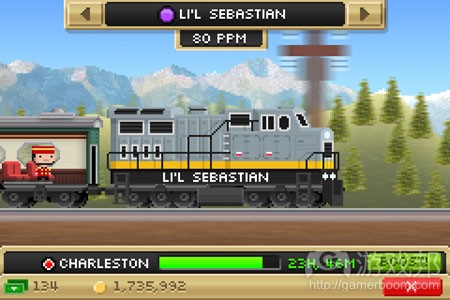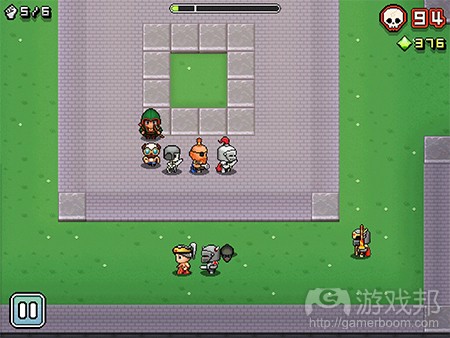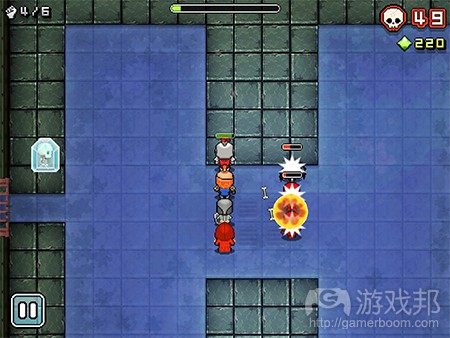Ian Marsh分享NimbleBit的成功经验
作者:Dennis Scimeca
那些上周参加了旧金山游戏开发者大会的人应该都知道NimbleBit联合创始人Ian Marsh登台详谈了他的工作室的成功过程;他用一系列“有所为”和“有所不为”表述了他的经验。
Marsh劝告听众不要迷信他说的字字句句,强调他们的方法仅适用于实力弱小的、从事免费游戏的独立开发者。
尽管如此,他的建议涉及面广,包括游戏创意、玩家社区建设和手机工作室面临的经济问题等,足以成为绝大多数手机游戏开发者的金科玉律。
自然地,我们不能放过让Marsh详谈他的原则的机会。以下是我们的问答内容。
你说开发者应该开发他们自己乐意玩的游戏。你是否曾经违背这条原则?
我们只中止了若干项目,因为在开发的某个阶段,我们不太喜欢它了。
印象最深的一次是,我们原本打算把《Pocket Planes》做成一款火车模拟游戏,并且投入了相当一段时间,但是这款游戏不够好玩,所以最终决定改成飞行游戏——实在是一次大变动,费了更多功夫。
我们认为改变是值得的,因为我们无法完成一款连我们自己都不喜欢的游戏,因为我们会觉得太厌烦了。
你建议玩家加入并鼓励在线社区的发展。NimbleBit越成功,游戏社区就越多,你在这方面遇到过什么困难?
就玩家社区而言,它曾是我们几乎不得不放弃、任其自生自灭的东西。
在我们以前开发的多款游戏中,我们一度管理好Facebook页面和论坛,但随着发布的游戏越来越多,管理工作也越来越多,所以现在我们就放手让玩家社区自行发展了,让骨灰级粉丝自己管理自己。
到目前为止,这个办法对我们似乎挺管用的。
你认为控制公司规模是有益的,但是,一旦商业腾飞了,你还能把持得住吗?
确实很有难度。
当你刚开始做出一些成功的游戏,你还不知道你将面临多少工作,但我们很明智,找到一些兼职人员帮忙记帐和做客服工作。
客服是最大的负担。找到一些人帮助做客服卸下了我们背上最沉重的包袱。
我们尽量找兼职人员,并且尽可能公平地分配余下的任务,这样每个人的负担都不会过大了。
如果我们希望有足够的开发人员的话,我们本可以利用我们的媒体影响力和曝光机会,雇用多个团队一年生产4、5款游戏,但那会让产品脱离我们的控制,把大量设计责任放到别人手中。
除非我们找到绝对合适的人,不然那种做法是不会让我们觉得稳妥的。
为了维持小规模,你们是否放弃过自认为确实不错的想法而专注于一个项目?
我认为我们还没有遇到在同一时间觉得两个想法一样好的时候。
通常我们总是选择我们认为最好的想法,如果我们又想到其他更好的创意,我们可能会直接转向那个创意,放弃原来正在开发的游戏。
如果我们想到什么绝对震撼心灵的东西,我们会迫不及待地转向它。
你认为手机游戏开发者必须互相帮助。NimbleBit是否从中得到益处?
我得说,最大的好处来自《Temple Run》。
我们和Imangi创始人Keith Shepherd、Natalia Luckyanova从一开始就是朋友。在发布新游戏时,我们总是保证交叉推广,随着我们开发的游戏越来越成功,显然那使我们双方都更强大了。
你的谈话的另一个要点是,不要担心盗版、抄袭或剽窃。那肯定不容易啊……
通常来说,在开发末期,我们会考虑如何确保游戏档案的安全、防止窜改、保障非作弊玩家的利益。
在测试阶段,总是不可避免地出现事与愿违的结果和误报。
然后,我们会放下一切,想:“算了,我们不管了。为什么要在一开始就想这么多?”
在开发过程中,我们仍然在学习这些。我们几乎从来没有为最终产品做过“防盗措施”。
你说2个月是开发周期的最佳长度。你们在《Tiny Tower》上花了4个月,《Pocket Planes》则费了7、8个月。那么《Nimble Quest》的开发周期是多长?
大约是7个月。因为新iPhone上市了,所以开发初期的部分时间费在更新上。
我们必须支持新的分辨率等等,所以《Nimble Quest》真正的开发周期大约是5、6个月。我们本想再缩减时间,但比起《Pocket Planes》所费的时间,已经省很多了。
保持短开发周期,你是否经常有违反原则的冲动?
我们违反原则的时候可能比我们想象中的还经常。
如果我们有一个大爱的创意,但需要的开发时间很长,既然我们的财政有保障了,也不是被枪逼着放弃,那就放手去做吧。
到目前为止,我们的关注力还是有限的,所以我们从来不考虑费时太长的项目。
你经常说,要把IAP(应用内消费)放在最后考虑。你们测试时都没有用到IAP。既然你们已经知道了你们的游戏可以挣多少钱,那么是否想过改变现在的配方?
不是的。
我认为我们成功的原因是我们的游戏设计,是因为我们对免费玩家的慷慨大方。是我们的大度为我们建立了坚实的玩家基础。
我们从来没有打算改变什么。到目前为止,我们的策略带来了成功,我们都感到相当满意。
P:另一条“有所为”,是“谦虚”吗?
I:不算其中一条,但“谦虚”总是好的。
当你成功时,不要忘记互相扶持、互相帮助,特别是面对新人时,因为你永远不知道他们日后会有什么成就。你必须记住自己是怎么成功的。
另一条原则是,“不要做你不想做的事”。比如说?
比如说开发Android应用吧。我们在Android上的表现不错,虽然那是我们重要的收益来源,但与人合作将我们的游戏尽早放上其他平台,确实是件非常费功夫的事。
虽然付出是值得的,但因为销售的问题,我们让出了很大的控制权,但却启发了我们尝试Unity,这样就可以由我们自己直接完成移植工作。
“不要让他人的请求浪费了你的时间。”当你们定下这条原则时,你们考虑的是什么?
我不记得所有新工作室的名字、赢利策略和应用发现服务,但是如果你榜上有名,你一定会为收到的邮件数量感到惊讶,即使我想,我也甚至没有时间回复每一封邮件。
你必须挑选,当你与其他开发者直接交流时,挑选并不难。
我们通常投票一致通过,以决定哪一种服务最好,更值得我们投入时间,所以只要你将精力放在值得付出的事情上,你的付出就不会白费。
我听说有人听了你的发言后,当场采纳你的商业意见,有这么回事吗?
是的。当你要参加大会时,你必须提前准备好,但我尽量表现得聪明吧。
最后一个问题——你说过,玩其他游戏也很重要。是什么游戏启发你开发一款动作游戏《Nimble Quest》而不是另一款模拟经营游戏?
《Nimble Quest》的灵感来自另一款机制类似的游戏,叫作《Call of Snakes》。
那款游戏比较低调,执行得也不太好,所以一直没有热门起来,但我们在办公室里花了很多时间玩它,然后想到如果我们在这款游戏中再添加一些东西并完善它的机制,也许会做出一款更好的游戏,所以就有了后来的《Nimble Quest》。(本文为游戏邦/gamerboom.com编译,拒绝任何不保留版权的转载,如需转载请联系:游戏邦)
NimbleBit’s Ian Marsh on the NimbleDo’s and NimbleDon’ts of development
by Dennis Scimeca
As those who were sunning themselves in San Francisco for GDC last week will know, NimbleBit co-founder Ian Marsh took to the stage to detail the secrets of his studio’s success, expressed as a series of do’s and don’ts.
By our count, there were 29 of them.
Marsh admonished his audience not to believe everything he said, and made it clear that his methodology was specific to small, independent developers making free-to-play games.
Nevertheless, his wide-ranging advice ran the gamut of creative, community, and business issues faced by smartphone studios, arguably serving as a series of rules applicable to almost any developer working within the mobile field.
Naturally, we couldn’t let Marsh get away without expanding on some of the rules he suggested to the audience, and promptly sat down with him afterwards for a probing Q&A.
Pocket Gamer: You said that developers should only make games they will enjoy playing themselves. Have you abandoned development on games by that principle?
Ian Marsh: There’s been only a handful of projects that we’ve canned entirely due to us not enjoying it at a certain stage.
The biggest example I can give is how we stared Pocket Planes as a train sim game and, pretty far into development, thought it just wasn’t fun enough and decided to change it to the plane game it became – which was a pretty big change and required a lot more work.
A screen from the canned Pocket Trains
We thought it was worth it because I don’t think we’re capable of finishing a game we don’t enjoy. We just get too bored with it.
You advised the audience to join and encourage the development of online communities. How difficult is it for you to do so the more successful NimbleBit becomes and the more games you have communities for?
In terms of the player communities, it’s been something that we’ve had to almost let go of and let grow and exist on its own.
In a lot of our earlier, successful titles we would manage Facebook pages and even forums at one point, but that got to be so much work as the number of games we released increased that now we allow that stuff to grow and flourish on its own and allow the die-hard, true fans to moderate it themselves.
And that’s worked pretty well for us so far.
You think it’s a good idea to keep companies small, but can you do that once a business takes off?
That’s been very challenging.
There are a lot of tasks that you never knew existed when you start having a couple successful titles out there, but we’ve managed to be smart about finding part-time help to do like bookkeeping and customer support.
That was the biggest load. That was the biggest weight off our backs, finding someone to do customer support for us.
We get part-time people where we can, and we try to distribute all the rest of the tasks between us evenly so that it’s not too big of a load on any one person.
Development wise, we could have multiple teams taking advantage of our media attention and exposure to produce four or five games a year if we wanted to have enough developers on board, but that takes our hands directly off of those products and puts a lot of the design responsibility in the hands of others.
That’s just not something we’re too comfortable doing unless we find the absolutely right people.
Have you ever had to pass up on ideas that you thought were really good but had to leave on the table to stay small and focus on a single project?
I don’t think we’ve ever had two ideas that we thought were equally great at the same time.
Usually we’re always going with what we think is our best idea at the time, and then if we come up with a better idea we would probably just switch to that idea [laughs] and leave development of the old game where it is.
Nimble Quest
If we ever think of something that just absolutely incredible and mind blowing we wouldn’t hesitate to just switch to pursuing that.
You think mobile developers need to scratch each others’ backs. What were some important relationships that paid off for NimbleBit?
I’d say the biggest example was Temple Run.
We’ve been friends with [Imangi Studios founders] Keith [Shepherd] and Natalia [Luckyanova] since the very beginning, and we always made sure to help cross-promote each other when either of us would release new games, and obviously that’s become much more powerful for both of us as we’ve had more and more successful games.
Another pillar of your talk was not worrying about piracy, cloning or cheating. That can’t always be easy…
Usually, what ends up happening late in development is that we think we’ve come up with a way to secure the game file or prevent tampering in some way that would never effect players who aren’t cheating.
Then it always, invariably ends up backfiring and triggering false positives during the beta.
Then we rip everything out and say, “No, we’re not caring about it. Why did we even care about it in the first place?”
It’s something that we keep relearning apparently during development. In the final product we almost never do any kind of anti-piracy stuff.
You said that two months is your sweet spot for development. You spent four months on Tiny Tower, seven to eight months on Pocket Planes. What was the dev cycle for Nimble Quest?
It was around seven months. Part of that time at the beginning was wasted doing updates when the new iPhone came out.
We had to have support for new aspect ratios and stuff like that, so real development time was probably around five to six months on Nimble Quest. We’d like to get it even shorter but it’s a lot better than we did for Pocket Planes.
How often are you tempted to break the rule about keeping to short development times?
We break our own rules probably more often than you’d think.
If we had an idea that we were so in love with that would take a long time to develop, now that we have the financial security to pursue a project like that without being under the gun, I think we would do it.
Tiny Tower
So far our attention span is short enough that we never feel like pursuing anything more than a few months’ development time.
You always talk about putting the in-app purchases in last. You beta test without it. Do you ever think about changing the formula now that you understand how much money your games can make?
Not really.
I think the reason we’ve had the success we’ve had is because that’s how we design our games, and because we’re so generous to free players. That’s what we’ve built our entire fan base [around], that kind of generosity.
I don’t think we’re ever tempted to change that. We’re more than happy with the success we’ve had with that strategy so far.
Could another NimbleDo be, “Be humble?”
That wasn’t one of them, but that’s a good one.
That goes along with scratching backs and helping others when you’ve had success, especially people starting out because you never know where they’re going to go. You’ve got to remember where you came from, for sure.
Another rule was “Don’t do anything you don’t want to.” Like what?
Probably getting our stuff on Android. It ended up working out for us because that’s a significant source of revenue, but it was a good deal of work to partner with people to get our games on other platforms early on.
While it was worth it, the amount of control we lost by having to shop that out is what inspired us to try out Unity so that we can deliver on those platforms ourselves directly.
“Don’t let suits waste your time.” What were you thinking about when you wrote that rule?
I don’t remember all the names of all the startups and monetisation and app discovery services, but you would be amazed at the amount of those emails you get once you’re on the charts, and I really wouldn’t even have time to answer them all if I wanted to.
You’ve got to pick and choose, and it’s easy when you’re talking with other developers.
Nimble Quest
The group consensus usually ends up being that certain services are better than other ones and more worth your time, so as long as you focus your energy into pursuing the ones that are worth your while it’s worth doing.
I heard somebody pitch you a business idea right after your panel, didn’t I?
Yeah. It’s even more than just emails and when you’re at conferences you have to be prepared for that too, but I try to be as graceful as I can and nice as I can. [Laughs].
Last question – you said that it’s important to always play other games. Were there any games that inspired you to make an action RPG like Nimble Quest rather than going with another sim management game?
The idea for the game came from playing a game with similar mechanics called Call of Snakes.
It was under the radar, wasn’t a particularly well-executed game, it never really gained popularity, but we spent a lot of time playing it in the office and started imagining what the game could be if you added a lot more to it and really polished a lot of the core mechanics, so that’s actually where Nimble Quest stemmed from.(source:poketgamer)











































 闽公网安备35020302001549号
闽公网安备35020302001549号